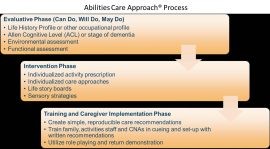Caring for individuals with dementia in skilled nursing facilities (SNFs) presents unique challenges. Often, their occupational needs are not fully met, and while individualized care and meaningful activities are known non-pharmacological solutions, they are underutilized. Instead, antipsychotic medications are frequently used to manage behavioral symptoms. The Abilities Care Program offers a different approach, focusing on enhancing the quality of life for these individuals through tailored and engaging care.
Understanding the Abilities Care Program Approach
The Abilities Care Program is specifically designed to meet the occupational needs of clients with dementia. Rooted in the cognitive disability model, it emphasizes what individuals can do, rather than focusing on their limitations. This program champions a collaborative care model, actively involving caregivers in adapting both caregiving strategies and the environment to facilitate meaningful engagement for clients. A core component of this approach is the development of individualized activity prescriptions, personalized care strategies, and life-story boards, all tailored to the unique needs and preferences of each person.
Key Principles of Abilities Care
The foundation of the Abilities Care Program rests on several key principles aimed at providing holistic and effective dementia care:
- Individualized Care: Recognizing that each person with dementia is unique, the program stresses care approaches that are personalized to their specific interests, backgrounds, cognitive and physical abilities, and medical needs.
- Meaningful Activities: Central to the program is the incorporation of activities that are meaningful and engaging for the individual. This helps to enhance their well-being and reduce behavioral symptoms through positive engagement rather than medication.
- Collaborative Approach: The Abilities Care Program fosters a partnership between healthcare providers, caregivers, and family members. This collaboration ensures a consistent and supportive care environment tailored to the individual’s needs.
- Non-Pharmacological Strategies: By prioritizing individualized activities and environmental adaptations, the program serves as a powerful non-pharmacological approach to managing dementia-related behavioral symptoms, reducing reliance on antipsychotic medications.
Implementing Abilities Care: The Training Program
To facilitate the widespread adoption of the Abilities Care Approach, an online training program has been developed for occupational therapy (OT) practitioners and students, particularly those affiliated with Ensign-related SNFs. This program utilizes effective teaching methodologies, encouraging reflection, content interaction, self-assessment, and practical application of learned skills.
 Process diagram illustrating the Abilities Care Approach
Process diagram illustrating the Abilities Care Approach
The training program aims to:
- Equip OT practitioners with the skills to deliver evidence-based and reimbursable services in dementia care.
- Encourage OTs to reflect on their values and embrace a collaborative model of care.
- Familiarize practitioners with the practical tools and resources of the Abilities Care Approach, accessible through a dedicated online portal.
In Conclusion
The Abilities Care Program represents a significant step forward in enhancing dementia care within skilled nursing facilities. By focusing on individual abilities, meaningful engagement, and collaborative strategies, this program offers a person-centered approach that prioritizes quality of life and well-being. For those interested in learning more and implementing this approach, further resources and literature are available to support the adoption of Abilities Care in dementia care settings.